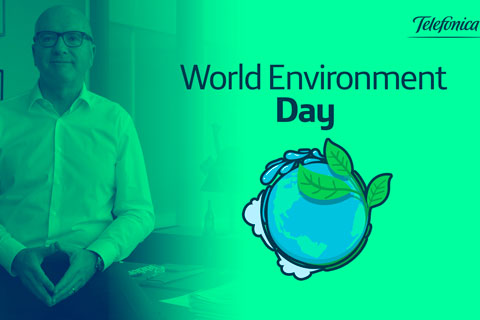June 5th, 2020
World Environment Day
Albert Einstein said, “In the middle of every difficulty lies opportunity”. The current crisis can help us reinvent ourselves and achieve a more environmentally friendly economic model.
This is the message that companies like Telefónica wanted to convey when they signed the “Uniting Business and Governments to Recover Better” Statement and the Spanish manifesto for a sustainable economic recovery, which both seek to align the post-COVID-19 recovery efforts with the goals of science-based CO2 emission reduction.
In an increasingly connected world, digitalisation is an excellent lever for accelerating many of the changes we must make in order to achieve this so-called green recovery. Not only is this true for industrial processes, but also those that involve all citizens: working on the move, virtual meetings or even remote medical consultation; all this reduces carbon emissions. Digitisation is the link that connects Europe’s recovery and plans for growth with the European Green Deal.
At the same time, at Telefónica we are convinced that tackling the climate crisis will enable us to put people at the focal point and in balance with the great system which we are a part of. It will help create jobs and improve business competitiveness, as well as the health and quality of life of individuals.
RESPONSIBLE RECOVERY
We all have a share in responsibility that we must bear. In the ICT sector, growth in data traffic has decoupled from energy consumption and carbon emissions over the last decade.
From 2010-2018, data traffic increased by 1,100%, while energy consumption only rose by only 10% and carbon emissions by 40% (mainly due to a shift to renewable electricity).
Specifically at Telefónica, traffic has increased almost fourfold in the last four years, while energy consumption—far from increasing—has fallen slightly (-1%), thanks to network overhaul and the development of energy efficiency projects. And we have cut emissions by about half.
This indicates that the expansion of the digital economy and data use does not corre-late directly with energy use and carbon emissions, thanks to more efficient networks and renewable energies. The figures for the coronavirus crisis back up this statement: energy consumption and carbon emissions from telecommunication networks have remained virtually unchanged in recent weeks, despite huge increases in network traffic.
In this context, the ICT sector recently established the Science-Based Pathway, a methodology emerging from the collaboration between ITU, GeSI, GSMA and the Sci-ence Based Targets (SBTi) initiative, which will allow mobile and landline carriers and data centres design emission reduction targets to meet the requirements laid out in the Paris Agreement. The goals set out by Telefónica have already been validated by SBTi, ensuring that they are necessarily ambitious to keep the increase in global tem-peratures below 1.5ºC.
GOAL: NET ZERO EMISSIONS
Telefónica is at the forefront in the race for carbon neutrality. In 2019 we achieved a global reduction of almost 50% of our emissions, fulfilling our commitment set for 2025. This progress and the urgency of the climate crisis, has brought us to challenge ourselves once again: we are advancing our goal of zero net emissions in our major operations from 2050 to 2030 at the latest.
This is undoubtedly a challenge that will require a great effort:
- Continue to promote energy efficiency, network renewal and legacy shutdowns, which will allow us to consume as little energy as possible even as the data trans-mitted by our networks grows year after year.
- Progress in our Renewable Energy Plan and install renewable self-generation solu-tions both in isolated base stations (minimising fuel consumption) and on our own rooftops.
- Reduce fossil fuel consumption in our fleet and in buildings.
- Reinforce preventive controls and maintenance that minimise accidental coolant gas leaks.
- Finally, emissions that cannot be eliminated will be compensated through CO2 ab-sorption projects.
ONE STEP FURTHER: HELPING OTHER INDUSTRIES TO DECARBONISE
Digital technologies can help reduce global carbon emissions by up to 15%, through solutions in energy, industry, agriculture and land use, buildings, services, transport and traffic management. This corresponds to the sum of the current carbon footprints of the EU and the United States.
Last year, we prevented the release of 3.2 million tonnes of CO2 thanks to our services, in such way that for every ton we sent into the atmosphere, our customers saved 3.3 tonnes. Our goal is to reduce our footprint by 10 by 2025. Clearly, our greatest contribution to the environment comes from digitalisation.
These figures emerge out of practical solutions where we help other companies to transform themselves digitally and become more sustainable. Services that during this crisis have contributed to reducing the negative impact of economic activity on the environment.
This encourages us to promote the development and commercialisation of this type of services: teleworking and video-conferencing applications, Smart Energy, Smart Lighting, Smart Parking, or Fleet Management solutions, cloud services, big data and Artificial Intelligence.
Hence the recent launch of our Eco Smart seal, which helps companies identify Telefónica solutions that enable them to reduce their energy or water consumption and CO2 emissions, and boost the circular economy.
The pandemic has led to the successful and increased use of certain digital solutions, confirming the great opportunity they represent. In fact, it is expected that after COVID-19 one-third of the global workforce will maintain remote work practices on a part-time basis, not to mention the continued growth of multi-channels and online commerce.
We are facing a new wave of change. Let’s make it all add up together. Let’s move forward to make digital and green transformation a reality that facilitates sustainable development.
#ConnectedWithThePlanet
